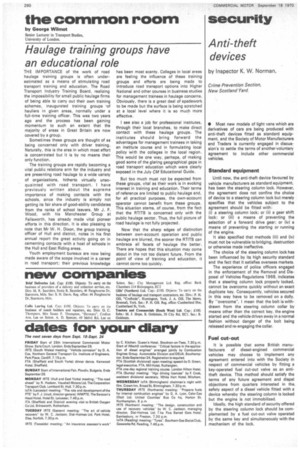the common room
Page 292

If you've noticed an error in this article please click here to report it so we can fix it.
by George Wilmot
Senior Lecturer in Transport Studies, University of London.
Haulage training groups have an educational role
THE IMPORTANCE of the work of road haulage training groups is often underestimated as a means of stimulating road transport training and education. The Road Transport Industry Training Board, realizing the impossibility for small public haulage firms of being able to carry out their own training schemes, inaugurated training groups of hauliers in given areas, normally under a full-time training officer. This was two years ago and the process has been gaining momentum to such an extent that the majority of areas in Great Britain are now covered by a group.
Sometimes these groups are thought of as being concerned only with driver training. Naturally, this is the area in which most effort is concentrated but it is by no means their only function, The training groups are rapidly becoming a vital public relations arm for the industry and are presenting road haulage to a wide variety of organizations, hitherto virtually unacquainted with road transport. I have previously written about the supreme importance of making contacts with the schools, since the industry is simply not getting its fair share of good-ability candidates from the ranks of school leavers. Mr J. F. Wood, with his Manchester Group at Failsworth, has already made vital pioneer efforts in this direction, It is also pleasing to note that Mr W, H. Dixon, the group training officer of Hull and district, notes in his first annual report the great activity going on in cementing contacts with a host of schools in the Hull and East Riding areas.
Youth employment bureaux are now being made aware of the scope involved in a career in road transport; their previous knowledge
has been most scanty. Colleges in local areas are feeling the influence of these training groups and efforts are being made to introduce road transport options into Higher National and other courses in business studies for management trainees in haulage concerns. Obviously, there is a great deal of spadework to be made but the surface is being scratched at a local level where it is so much more effective I see also a job for professional institutes, through their local branches, to make direct contact with these haulage groups. The institutes should bring forward the advantages for management trainees in taking an institute course and in formulating local policy with the colleges in the local region. This would be one way, perhaps, of making good some of the glaring geographical gaps in road transport education which were clearly exposed in the July CM Educational Guide.
But too much must not be expected from these groups, vital as their work is in evoking interest in training and education. Their terms of reference are limited to public haulage and, for all practical purposes, the own-account operator cannot benefit from these groups. This situation stems, of course, from the fact that the RTITB is concerned only with the public haulage sector. Thus, the full picture of road haulage is not fully projected.
Now that the sharp edges of distinction between own-account operation and public haulage are blurred, the sooner the RTITB can embrace all facets of haulage the better. There are hopes that this situation may come about in the not too distant future. From the point of view of training and education, it cannot come too quickly.






























































































































































































































































































































































































